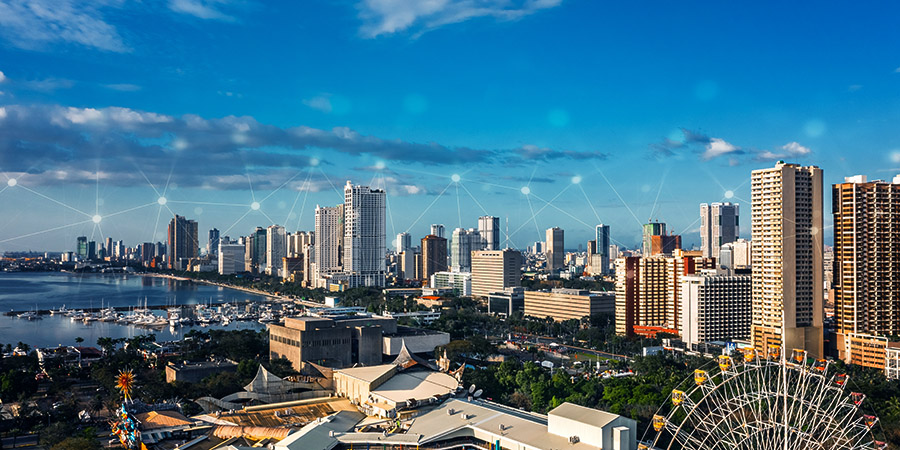Globe Telecom is advocating for the elimination of lease fees charged by property developers for installing telecommunication infrastructure in their buildings. This initiative aims to reduce operational costs for telecom companies, fostering a more competitive market and ultimately benefiting consumers with improved connectivity and services.
The company highlighted successful implementations of similar policies across the Asia Pacific region, including Australia, Singapore, and Hong Kong. “The experiences of Australia, Singapore and Hong Kong demonstrate that zero-lease practices for telecom infrastructure can lead to more efficient market operations and better consumer services,” said Globe President and Chief Executive, Ernest L. Cu.
“It will be an advantage for the Philippines to adopt similar policies, paving the way for enhanced digital connectivity and competitiveness in the region,” he added.
Currently, real property developers and owners of buildings such as malls, office spaces, hotels, and condos charge telcos for installing in-building telco infrastructure to provide necessary connectivity within their premises. Globe argues that such fees are unnecessary and that telco facilities should be treated the same as water and power utilities, for which developers already provide necessary space without charging lease fees.
Latest Industry News: BBIX, PLDT and Smart to Boost Data Roaming in the Philippines
Mandatory Classifications
To support this initiative, Globe endorses revising the National Building Code to classify telcos’ in-building solutions (IBS) as essential infrastructure for developments. House Bill No. 900, filed by Tarlac 2nd District Representative, Christian Tell Yap, proposes an additional section that would classify "telecommunications facilities such as in-building solutions and fiber optic cabling for high capacity and high-speed requirements" as mandatory for "multi-dwelling buildings, commercial buildings, government and office buildings, public and private schools, and government and private hospitals.”
Furthermore, House Bill No. 8534, filed by Albay 2nd District Representative, Joey Salceda, explicitly prohibits building owners and developers from imposing “any cost, expenses, charges or rent… for the provisioning of telecommunications services” in their respective properties.
By adopting these measures, Globe Telecom believes that the Philippines can significantly improve its digital infrastructure, providing better connectivity and fostering a more competitive telecommunications market.
Telecom Review Asia Exclusive Feature: Data Privacy and Security Concerns in the Philippines Telecom Sector
Barriers to Connectivity and National Development Goals
The imposition of lease fees by property developers for the installation of telecommunication infrastructure in buildings poses several significant problems:
- Increased Operational Costs: Telecom companies face higher operational costs due to these lease fees. This financial burden can lead to increased service costs for consumers, as telecom companies may utilize their customers to cover additional expenses to maintain profitability.
- Hindered Market Competitiveness: High lease fees can create barriers to entry for smaller telecom operators, reducing competition in the market. A less competitive market can lead to poorer service quality and higher prices for consumers as there is less incentive for telecom companies to innovate and improve their offerings.
- Slower Infrastructure Development: Lease fees can slow down the deployment of critical telecommunication infrastructure. Telecom companies might delay or avoid installing infrastructure in buildings with high fees, leading to gaps in connectivity and coverage, especially in densely populated urban areas where reliable and fast internet is crucial.
- Unequal Digital Access: Buildings that do not have the necessary telecom infrastructure due to high lease fees can suffer from poor connectivity. This digital divide disproportionately affects residents and businesses in those buildings, limiting their access to essential digital services and opportunities, such as remote work, online education, and e-commerce.
- Impediment to National Development Goals: In countries like the Philippines, where digital connectivity is crucial for economic development and global competitiveness, high lease fees for telecom infrastructure undermine national efforts to enhance digital infrastructure. This can impede progress towards achieving broader socio-economic goals, such as inclusive growth and improved quality of life.
- Comparison with Other Utilities: Unlike water and power utilities, for which developers provide necessary space without charging lease fees, telecommunication services are treated differently. This inconsistency creates an unfair financial burden on telecom companies, despite the essential nature of their services in today’s digital age.
- Legislative and Regulatory Challenges: The lack of standardized regulations mandating zero lease fees for telecommunication infrastructure necessitates legislative action. Bills like House Bill No. 900 and House Bill No. 8534 aim to address these issues, but until such measures are enacted, the problem persists, creating uncertainty and hindering the telecom sector’s growth.
Latest Service News: PLDT, Smart Communications Launch Cloud Center of Excellence in the Philippines
Eliminating lease fees for telecommunication infrastructure in buildings is essential to reduce operational costs for telecom companies, enhance market competitiveness, accelerate infrastructure development, and ensure equitable digital access. It aligns with practices in other regions where such policies have proven beneficial. Telecommunication operators such as Globe strongly believe that addressing this issue is vital for the Philippines to achieve its digital connectivity and economic development goals.
Read More: The Growth of ICT and the Digital Evolution of the Philippines
Read More: Advancing Digital Inclusion Efforts and ICT Development in the Philippines





